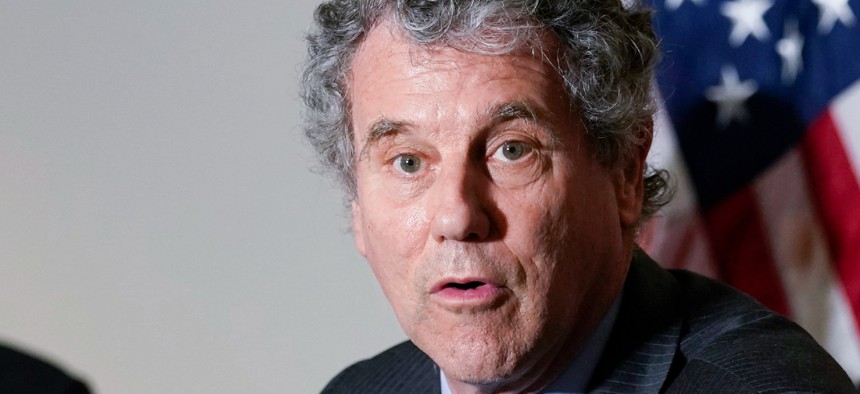Senators Reintroduce Bill to Protect Federal Employees Returning to Workplaces

Sen. Sherrod Brown, D-Ohio, is one of the senators who introduced the bill. Susan Walsh / AP
The House passed an earlier version last Congress.
As the Delta variant of the coronavirus surges, particularly among those not vaccinated, a group of Democratic senators reintroduced legislation on Wednesday to better protect federal employees and contractors when they return to workplaces.
Sens. Mark Warner, D-Va., Tim Kaine, D-Va., Ben Cardin, D-Md., Chris Van Hollen, D-Md., and Sherrod Brown, D-Ohio, reintroduced the “Chai Suthammanont Remembrance Act,” which is named after a federal employee from Virginia who died from complications of the novel coronavirus, to which he was likely exposed at work. His wife wrote in Government Executive last year about what he went through.
“The frontline federal employees that have reported to work throughout this ongoing pandemic deserve gratitude, protection and support,” Brown said in a statement. “With the emergence of the Delta variant of the COVID-19 virus, we must recognize and act on the risks these workers face during this health emergency. There’s no reason why civil servants should have to worry about whether their work environment is safe enough for them to carry out their duties.”
The bill would require the heads of all federal agencies to consult with their human capital officers and administrative directors to establish and then publish online workplace safety plans no later than 60 days after the bill is enacted. The plans must address: coronavirus testing for employees and contractors, contact tracing and the notification process if there is a suspected positive case, vaccine administration, cleaning protocols, personal protective equipment the agency will give to employees, methods to protect employees who work outside of federal buildings or when they are on official travel, contingency plans if there is a surge in cases and the information to contact inspectors general to report any issues.
Another provision is the plans must include “a description of any rule or protocol regarding whether employees of the agency required to be physically present at covered worksites are required to be fully vaccinated before being present at covered worksites” and are allowed to take leave in order to get a COVID-19 shot and/or if they have severe side-effects as a result. The parts of the bill on vaccines were not in the House and Senate versions introduced last year.
For worksites that closed due to the pandemic, the plans must be implemented no more than 30 days before employees or contractors are required to be back on site.
The bill would also require that no more than six months after the plans are posted, inspectors general submit a report to the House Oversight and Reform and Senate Homeland Security and Governmental Affairs committees on how their agencies complied with the requirements.
The House passed an earlier version of the legislation last October and the House Oversight and Reform Committee approved the updated version in May. Public Citizen, a consumer advocacy group; the National Treasury Employees Union; the National Federation of Federal Employees; and the International Federation of Professional and Technical Engineers are in support of it.
The bill “sends a strong message to agency leaders that employee safety is paramount and that civil servants deserve a work environment that incorporates the lessons learned from the pandemic and protects federal workers as they continue to serve the American people,” said Tony Reardon, national president of NTEU.
The senators reintroduced the legislation ahead of the Monday deadline for agencies to submit their finalized return to office plans to the Office of Management and Budget, one of the agencies on the Biden administration’s Safer Federal Workforce Task Force. Many federal employees have returned to their worksites already, so it is unclear how, if at all, the plans will change anything for those employees.



